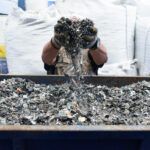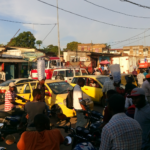International roundtable series launches on nuclear disarmament and economic development
By Bulletin Staff | March 27, 2012
Today on its website, the Bulletin of the Atomic Scientists launches a new monthly Nuclear Disarmament and Economic Development Roundtable series in which experts from emerging and developing countries debate crucial, timely topics in nuclear energy, nuclear proliferation, and economic development.
Today on its website, the Bulletin of the Atomic Scientists launches a new monthly Nuclear Disarmament and Economic Development Roundtable series in which experts from emerging and developing countries debate crucial, timely topics in nuclear energy, nuclear proliferation, and economic development.
The first month's Roundtable asks Brazilian energy expert Gilberto Jannuzzi, Malaysian security analyst Shahriman Lockman, and Indian scholar of international relations P.R. Kumaraswamy to address the question: "How can nuclear power for economic development be made available to developing countries without increasing the risk of nuclear weapons proliferation?"
Jannuzzi's article appears today; Lockman and Kumaraswamy's articles will follow on Wednesday and Thursday. In online essay exchanges over the next six weeks, the three experts will assess the fairness of the international nonproliferation regime, appraise the true severity of proliferation risks, and discuss how much electricity is really needed for developing countries to grow richer.
"In international conversations about nuclear issues," says Mindy Kay Bricker, the Bulletin's editor, "Western voices often dominate, while others struggle to receive a full airing. Our Roundtable series seeks to address this problem by focusing solely on experts from emerging and developing countries and encouraging them to explore ideas specific to their countries and regions. Each month's Roundtable will introduce a new and provocative topic, showcase a fresh set of voices, and provide exposure for vitally important points of view."
The series aims to provoke discussion in a broad range of countries. To help accomplish this, all essays will be translated into Arabic, Chinese, and Spanish. Translation into these languages will increase the Roundtables' impact in the Middle East, East Asia, and Latin America — regions where nuclear decisions are often complicated by political tensions, an urgent need for economic development, or both. (Translations will appear on the Bulletin's website one week after publication in English.) The Norwegian Foreign Ministry provided a three-year grant for the Roundtable.
"Ultimately, the Roundtable series strives to broaden the perspectives of policy makers and civil society leaders in the developed world, increase the visibility and nuclear expertise of leaders in the developing world, and bridge gaps in understanding between industrial and developing countries," says Kennette Benedict, Executive Director of the Bulletin. "We are especially grateful to the Norwegian Foreign Ministry for financial support of this project."
Bulletin of the Atomic Scientists
The Bulletin is an independent nonprofit 501(c)(3) organization that publishes analysis and conducts forums about nuclear security, climate stabilization, and safety in the biosciences. Founded by Manhattan Project scientists from the University of Chicago, the Bulletin links the work of scholars and experts with policy-making bodies and citizens around the world. An international network of authors assesses new scientific advancements that involve both benefits and risks to humanity, with the goal of influencing public policy to protect the Earth and its inhabitants. The organization's scientific advisory boards include 18 Nobel laureates, ambassadors, leading scholars, distinguished nongovernmental organization officials, and public policy experts. The Bulletin is closely followed in Washington and other world capitals; its iconic Doomsday Clock draws international attention to global risks and solutions
Together, we make the world safer.
The Bulletin elevates expert voices above the noise. But as an independent nonprofit organization, our operations depend on the support of readers like you. Help us continue to deliver quality journalism that holds leaders accountable. Your support of our work at any level is important. In return, we promise our coverage will be understandable, influential, vigilant, solution-oriented, and fair-minded. Together we can make a difference.














